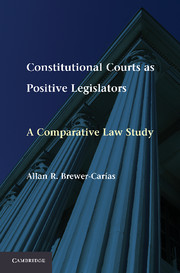Book contents
- Frontmatter
- Contents
- AUTHOR'S NOTE
- PART ONE CONSTITUTIONAL COURTS AS POSITIVE LEGISLATORS IN COMPARATIVE LAW
- CHAPTER 1 JUDICIAL REVIEW OF LEGISLATION AND THE LEGISLATOR
- CHAPTER 2 CONSTITUTIONAL COURTS' INTERFERENCE WITH THE CONSTITUENT POWER
- CHAPTER 3 CONSTITUTIONAL COURTS' INTERFERENCE WITH THE LEGISLATOR ON EXISTING LEGISLATION
- CHAPTER 4 CONSTITUTIONAL COURTS' INTERFERENCE WITH THE LEGISLATOR REGARDING LEGISLATIVE OMISSIONS
- CHAPTER 5 CONSTITUTIONAL COURTS AS LEGISLATORS ON MATTERS OF JUDICIAL REVIEW
- PART TWO NATIONAL REPORTS
- ARGENTINA
- AUSTRALIA
- AUSTRIA
- BELGIUM
- BRAZIL
- CANADA
- COLOMBIA
- COLOMBIA
- COSTA RICA
- CROATIA
- CZECH REPUBLIC
- FRANCE
- GERMANY
- BELGIUM, FRANCE, GERMANY
- GREECE
- HUNGARY
- INDIA
- ITALY
- MEXICO
- NETHERLANDS
- NORWAY
- POLAND
- PORTUGAL
- SERBIA
- SLOVAK REPUBLIC
- SWITZERLAND
- UNITED KINGDOM
- UNITED STATES OF AMERICA
- VENEZUELA
- PART THREE SYNTHESIS REPORT: CONSTITUTIONAL COURTS AS POSITIVE LEGISLATORS IN COMPARATIVE LAW
- APPENDIX
- INDEX
HUNGARY
Constitutional Court as Positive Legislator
Published online by Cambridge University Press: 04 August 2017
- Frontmatter
- Contents
- AUTHOR'S NOTE
- PART ONE CONSTITUTIONAL COURTS AS POSITIVE LEGISLATORS IN COMPARATIVE LAW
- CHAPTER 1 JUDICIAL REVIEW OF LEGISLATION AND THE LEGISLATOR
- CHAPTER 2 CONSTITUTIONAL COURTS' INTERFERENCE WITH THE CONSTITUENT POWER
- CHAPTER 3 CONSTITUTIONAL COURTS' INTERFERENCE WITH THE LEGISLATOR ON EXISTING LEGISLATION
- CHAPTER 4 CONSTITUTIONAL COURTS' INTERFERENCE WITH THE LEGISLATOR REGARDING LEGISLATIVE OMISSIONS
- CHAPTER 5 CONSTITUTIONAL COURTS AS LEGISLATORS ON MATTERS OF JUDICIAL REVIEW
- PART TWO NATIONAL REPORTS
- ARGENTINA
- AUSTRALIA
- AUSTRIA
- BELGIUM
- BRAZIL
- CANADA
- COLOMBIA
- COLOMBIA
- COSTA RICA
- CROATIA
- CZECH REPUBLIC
- FRANCE
- GERMANY
- BELGIUM, FRANCE, GERMANY
- GREECE
- HUNGARY
- INDIA
- ITALY
- MEXICO
- NETHERLANDS
- NORWAY
- POLAND
- PORTUGAL
- SERBIA
- SLOVAK REPUBLIC
- SWITZERLAND
- UNITED KINGDOM
- UNITED STATES OF AMERICA
- VENEZUELA
- PART THREE SYNTHESIS REPORT: CONSTITUTIONAL COURTS AS POSITIVE LEGISLATORS IN COMPARATIVE LAW
- APPENDIX
- INDEX
Summary
ANTECEDENTS OF CONSTITUTIONAL ADJUDICATION
Before the political transition, no institution could emerge for the protection of the Constitution, given the nature of the ancien régime. However, the general refusal of constitutional jurisdiction was not unanimous in legal literature; from the mid-960s, several authors have suggested setting up an institution to grant remedies for any violation of the Constitution. In the history of Hungarian public law, there has been no institution performing the classical functions of constitutional jurisprudence. The Constitution of 1949, a break from the traditions of European and Hungarian constitutional development, terminated the public institutions performing similar functions to a constitutional court (e.g., Canvassing Court, Administrative Court).
The revolution of 1956 eliminated the former organizations of dictatorship, but it had no time to create the conditions of constitutionalism. Within the frameworks of the political system, the constitutional revision of 1972 emphasized the necessity of the protection of the Constitution, and the idea of a parliamentary committee arose, controlling constitutionalism. However, politicians had found the institution suspicious until the middle of the 1980s, when the idea of establishing an organ, formally separate from Parliament, emerged to institutionalize “efficient” protection of the Constitution. This organ was the Constitutional Council. The adoption of the law in 1983 was a new and significant step toward fostering constitutional protection, even though it could not act as real protector in the political atmosphere. First, because the majority of its members were elected by, and responsible to the Parliament, which could recall them any time.
- Type
- Chapter
- Information
- Constitutional Courts as Positive LegislatorsA Comparative Law Study, pp. 575 - 586Publisher: Cambridge University PressPrint publication year: 2011
- 3
- Cited by



